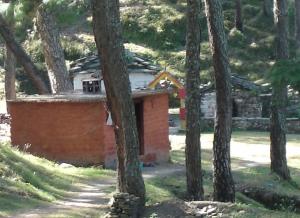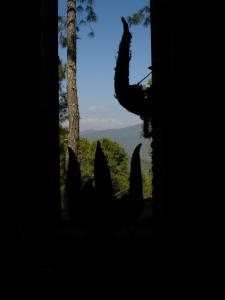Burfi, named by my friends after their favourite Indian sweet, is an energetic young mountain dog, keen for her morning walk. We decide to take her up to the nearby Shivalay (prn: she-VAH-lee, roughly translated, abode of Shiva) temple. As we approach, climbing the slope, it's impossible not to notice the rubbish strewn here and there across the otherwise unspoilt and verdant Chir Pine-forested hillside. The priest, who was invited by the villagers to live there four or five months previously, has with him three young guys who look in their mid- to late-teens, and it seems they've just brought him a top up for his stash of grass. Many of the locals have a small crop in their gardens. They keep a little, sell a little, give a little, which seems as right here as anywhere. Marijuana grows well hereabouts – not the stunted little hydroponically cultivated things some folks struggle to grow in their lofts at home, oh no. These are strong plants, ten feet tall, like big bad bull rushes.
We stop to take a look at the temple and for a brief chat with the congregation in the broken Hindi and English we share between us, as the boys and the priest toke amongst themselves. The roofs of the stone temple buildings are in the traditional Kumaoni style – large, gently sloping slates several square feet in size, with a small chimney vent at the centre. Although the temple was constructed recently, much of the material was recycled from the ruins of earlier buildings at the same site. This place has been holy ground for ages. Artifacts uncovered here are over a thousand years old and from a number of faiths: Christian, Muslim, Hindu. Perhaps once it was a shelter on some common pilgrimage route; no one seems to know. As we are about to take our leave, the priest says something containing a word I do recognise, one of my favourites – chai. We've been invited to stay for tea.

 Shivalay temple, near Chitai
Shivalay temple, near Chitai
Tea for two
We move from the wall of the temple, leave our boots at the door of the priest's one-room house, and sit cross-legged around the central, square fireplace. The eldest lad, who is 21, sets about preparing the fire. Whether it's the weed or simply pleasure in serving the holy man that has put the smile on his face, we don't know but he cheerfully constructs a delicate pyramid of kindling. With a little guidance and a smouldering newspaper taper from the priest, soon enough a small, potent blaze comes alive. I sit opposite the door, open to a magical view of the Himalaya dancing in the heat haze. The young man retrieves a small, ancient-looking, round cast iron trivet from the corner and stands it over the fire. The priest places his battered and blackened pan on the trivet and pours in chai from a green plastic thermos flask to heat. For a man who owns nothing, he has an incongruous collection of equipment.
The priest is called Baba, a colloquialism for father. His vocation required him to give up all worldly things, including his given name. Allowed no possessions, he lives on donations, including the grass he chain smokes in spliffs made with tobacco from the pack of Capstan on the floor. The little one-room house was set up for him by the villagers, who contributed what they were able: the front door, wood for the fire, the packs of cigarettes. Nonetheless he is generous with what he has. Baba has enough chai to fill two small stainless steel beakers, one for each of his unexpected guests – full sugar, naturally.

 View from Baba's house
View from Baba's house
As the pan simmers, Baba recites an intermittent mantra which rises with the smoke through the hole in the ceiling that serves as his chimney. Two Trishul, the curved trident, weapon and symbol of Shiva, blackened and furred from the fire, stand in the grate. One is garlanded with a Rudraksha mãlã, the 108-bead Hindu rosary with which the priest counts his mantras. There is a large stack of freshly-cut wood in one corner by the door.
On the other side, from front to back, is his bed, a wooden board beneath a thin mattress-pad raised from the ground by short stacks of bricks with a simple blanket against the autumn nights. The small, square space, perhaps eight feet along each side, is warm, though. These walls of stone and mud, maybe mixed with a little lime if any was to be had during the building, retain the heat from the fire well and are helped by the mats on the floor upon which we sit. Unlike the temple buildings, the house has a modern, austere roof, flat but still with the semi-open chimney. The door is a thin, packing crate-style wooden affair, tacked onto a light steel three-panelled frame. The walls, floors and the deep ochre hearth wall, one course of bricks high, are smoothly finished. Care has been taken in the construction of this place.
A friendly fireside chat
My friend and I, Baba and the young man sit around and talk as best we can, my friend with a little Hindi and the lad with a little English helping to build a language bridge. Baba, recently returned from the Himalaya, is from the nearby village of Barechhina; he was invited to live here by the villagers of Chitai. His age is hard to estimate. People tend to age more quickly here. It's a hard, outdoor life and his would be tougher than many. His skin is creased and tanned like weathered leather. At first I took him for an old man, but he doesn't move or sound like one. He's probably younger than he appears – around fifty, maybe a touch less. His young friend helps with the chai and rough translation. He too hopes to travel the following summer, to Panchchuli, the famous five peaks which dominate the horizon to the northeast. The chai poured, he carefully removes the trivet from the fire with a cleft stick and replaces it in the corner. As we drink, Baba recycles his roach into his next joint, blessing it, or us, or something, as he does so. He seems a contented soul. In any case, it's always good to see someone happy in his work.
Our chai finished, we realise we said we'd only be gone a short time to walk Burfi, whom we can now hear becoming impatient outside the door. We thank Baba for his hospitality and leave him puffing away at his latest creation. Later we'll return with some fruit for him as thanks for the chai – and maybe a small rubbish bin, as a gentle hint.